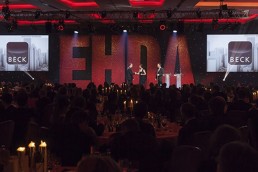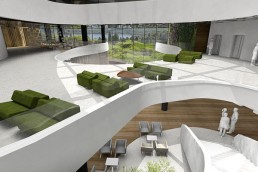A hub for creativity and innovation, London’s multiplicity of sectors are having an impact on hotels, and vice versa.
The lines between all streams of hospitality are becoming increasingly blurred. While some keep it simple and stick to the standard bed-and-breakfast service, others are expanding their offering to include retail, members-only services and even the opportunity to work and live-in.
Hybridisation is nothing new of course – the transformation of lobbies into multifunctional areas with bars, cafés and co-working for instance, has been under way since the early 2000s – but the remit has widened of late, with hotels no longer bringing together just concepts, ideas and spaces, but entire sectors too.
HOTEL MEETS RETAIL
As reported last issue, retail was one of the markets that hospitality had been forging a close relationship with pre-Covid; hotels were searching for new forms of income that would retain cash otherwise spent beyond their walls, whilst bricks-and-mortar retail went about introducing experiential elements to drive engagement and combat online sales – think exclusive pop-ups and multi-sensory shopping.
What was once an afterthought has become a fundamental consideration, with hospitality designers increasingly being asked to bring their expertise to retail spaces in order to make them more gratifying for consumers. The Hoxton and CitizenM were among the first to pioneer the integration of retail into their offer during the noughties, and since then, disruptive brands like 25hours, W Hotels and Ace have done the same – the latter created something of a touchstone at its Shoreditch property back in 2013, when London-based practice Universal Design Studio envisioned a front-desk-retail combo that brought the trend to the mainstream.
Fast forward eight years and the concept of retail-meets-hospitality is gathering pace across the capital. From Dior’s pop-up rooftop restaurant at Selfridges on Oxford Street – adorned with the fashion house’s signature Toile de Jouy pattern – to Shoreditch’s new Gensler-designed shopping experience, Eataly, the convergence of the two sectors is in full flow.
In Knightsbridge, David Collins Studio – who recently completed the design of Nobu Hotel London Portman Square in Marylebone – has transformed Harrods’ food halls as part of a four-year restoration, paying tribute to the department store’s heritage by creating an environment that reflects its original Edwardian grandeur, while in Belgravia, multidisciplinary firm Farrells – which counts St Ermin’s Hotel in St James’s Park amongst its clientele – has overhauled a 19th century building to create Pantechnicon, a trendy shopping and dining destination that celebrates Nordic and Japanese craft through food, drink and design.
And venturing into the world of sustainable fashion, Page8 London has partnered with rental app By Rotation to offers guests the chance to rent wardrobe staples from a tailored look-book. The collaboration allows residents to order up to ten items straight to their room and receive them in under 90 minutes. Hotel guests can also plan ahead and order looks before arrival, meaning when they check-in, the pieces will be steamed, pressed and hung in their wardrobe waiting to be worn.
As the hospitality and retail sectors look to regain some of the losses caused by the pandemic, expect to see the hybridisation of both industries continue – a closer synergy and the further evolution of the experience-led model could well hold the key to their revival in the months ahead.
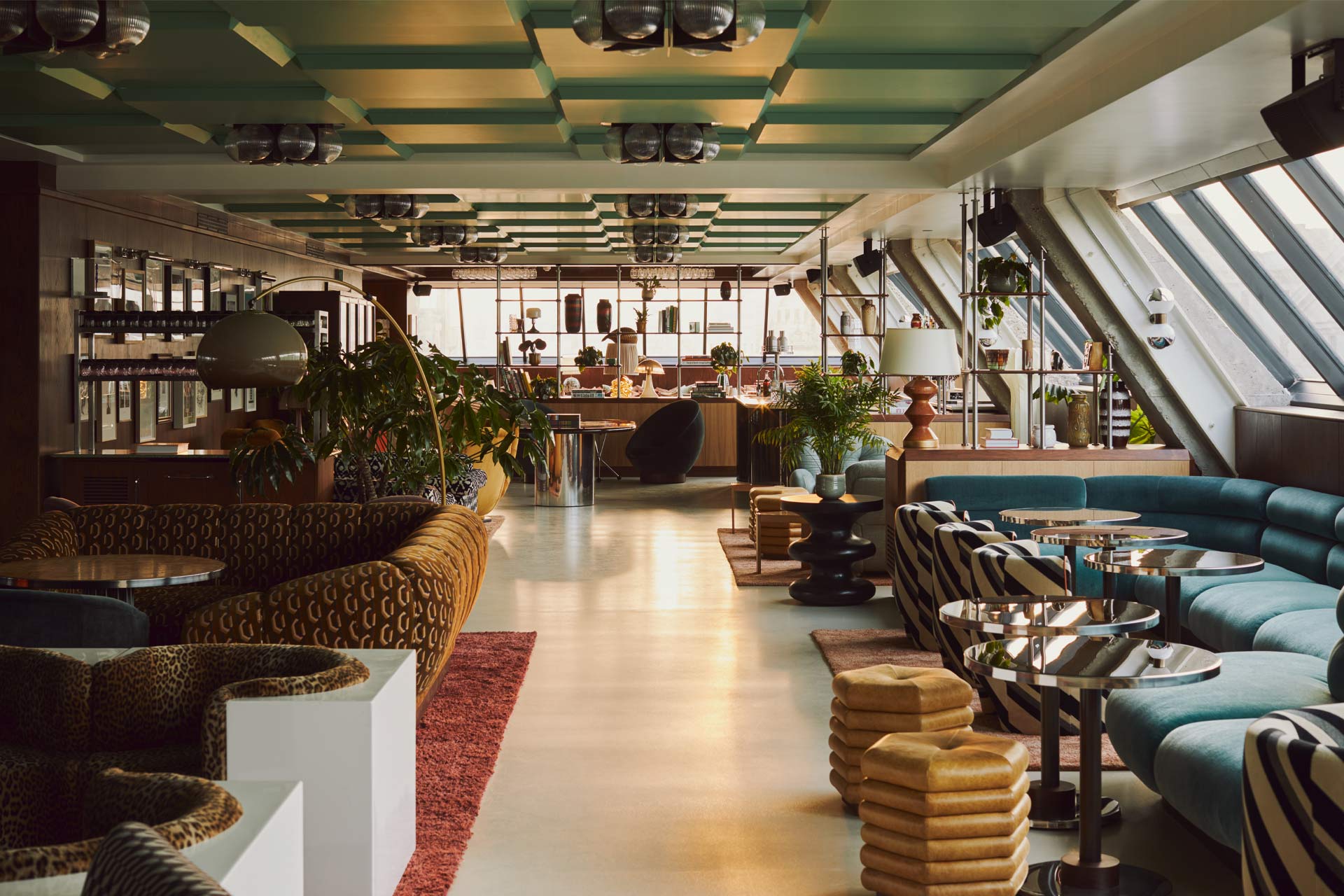
HOTEL MEETS MEMBERS-ONLY
Another market that hoteliers are tapping into – and vice versa – is private members’ clubs, which have become trendy again thanks to the reinvention of institutions such as The Arts Club, Annabel’s and Devonshire Club, and the arrival of newcomers like Groucho and Soho House – some of which come with guestrooms as part of the offer.
Having already made its mark on the capital with a series of exclusive boltholes, including AHEAD award-winning hotel and members’ club The Ned in the former Midland Bank building, Soho House has expanded its revered portfolio with a new cultural hub on the Strand.
Spread across nine floors and decked in 1970s-style interiors that reflect its Brutalist architecture, 180 House comprises a restaurant, bar and rooftop pool, together with a health club and ground level social space boasting a pop-up eatery with revolving food concepts. Members can also make use of Soho Works’ new London flagship from floors one to seven; built around a central hub, each storey offers hot-desking and dedicated offices.
In the heart of the East End meanwhile, The Curtain Members’ Club is currently undergoing an update and restyling as part of the hotel’s transformation into Mondrian Shoreditch, though the underground club element will retain its name and continue to operate as usual – a relief for its devoted patrons – when the rebranded property is unveiled later this Summer.
Also catching the attention of late was Christabel’s at Fulham Town Hall, a prohibition-inspired refuge that merged conceptual art, storytelling and musical entertainment. Arriving in the former Mayor’s Parlour for a three-week stint alongside provocative exhibition Art in The Age of Now, the concept was billed as an ‘avant-garde alternative to London’s affluence-enamoured members-only establishments’ and will now commence life as a clandestine club held in secret locations throughout the city. For Fulham Town Hall on the other hand, work has begun to convert the building into a boutique hotel with 90 rooms, a variety of restaurants and bars, and co-working space.
There’s more developments in the pipeline too, with British-Iranian property tycoon Robert Tchenguiz set to turn MI5’s former Mayfair headquarters on Curzon Street into a 78-key hotel and private members’ club encompassing a health club and spa, retail units, a restaurant and bar, and a screening room. A rooftop dining venue and lounge area housed under a domed glass enclosure round out the ambitious plans, though an opening date is yet to be announced.
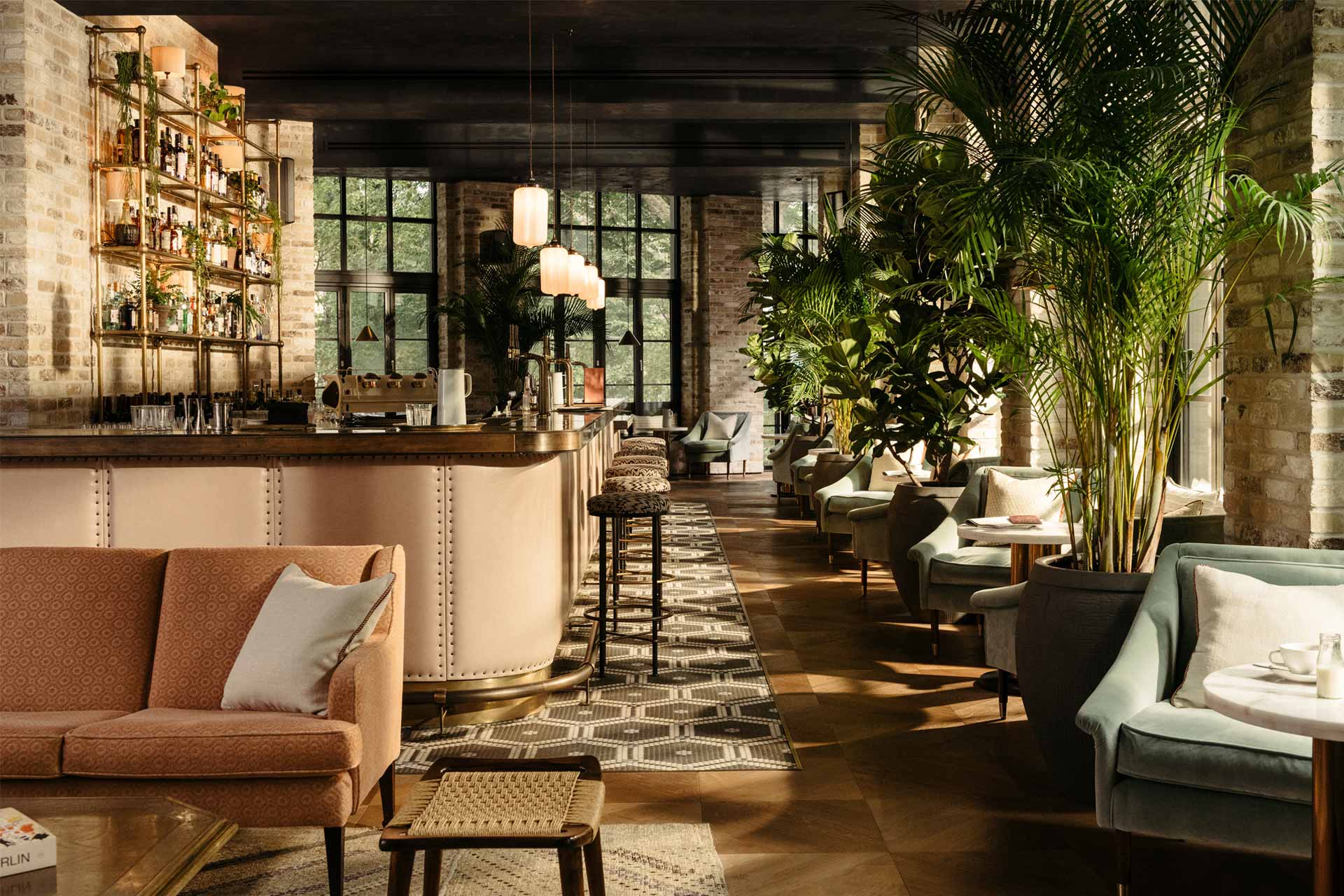
HOTEL MEETS CO-WORKING
After the global WFH experiment of the past 18 months, hotels are being used as offices more than ever, with corporates and creatives looking for stylish co-working areas that offer flexibility, cosy interiors, plenty of desk space and good quality coffee.
Co-working has been on an upward trajectory since the movement first materialised at the turn of the millennium, with an influx of major brands entering the London market in the years since; WeWork now has no less than 44 sites across the capital, while design-led workspace specialist Labs has nine to its name so far and more in the pipeline. In turn, the hotel lobby has evolved into an ad hoc office of its own, welcoming all walks of life – whether they’re staying overnight or not.
The comfy lobbies of The Hoxton hotels have been unofficial workspaces-of-choice for Londoners since 2006, but in response to the needs of creatives and freelancers, the brand made it official in 2019, launching Working From_, a dedicated working environment with studios, offices, wellness programmes and nutritionist-designed brain food. Introduced at The Hoxton Southwark just before the pandemic took hold, the concept describes itself as ‘like a working from home, but without the distractions’.
Another to recognise the potential of communal workspaces was The Zetter Group, which handed over the underperforming bar at its Clerkenwell outpost to Central Working in 2016, meaning the space could cater to members-only during the day and the public come evening, when food and wine are served. A similar approach by design-led aparthotel brand Locke has been met with success; its growing collection of London sites are now popular haunts amongst the capital’s remote workers, with seats hard to come-by for those who fancy a change of scenery without venturing beyond zone two.
With some businesses shedding their costly offices altogether, operators have gone so far as to suggest that hotels will be the primary place to work post-pandemic.
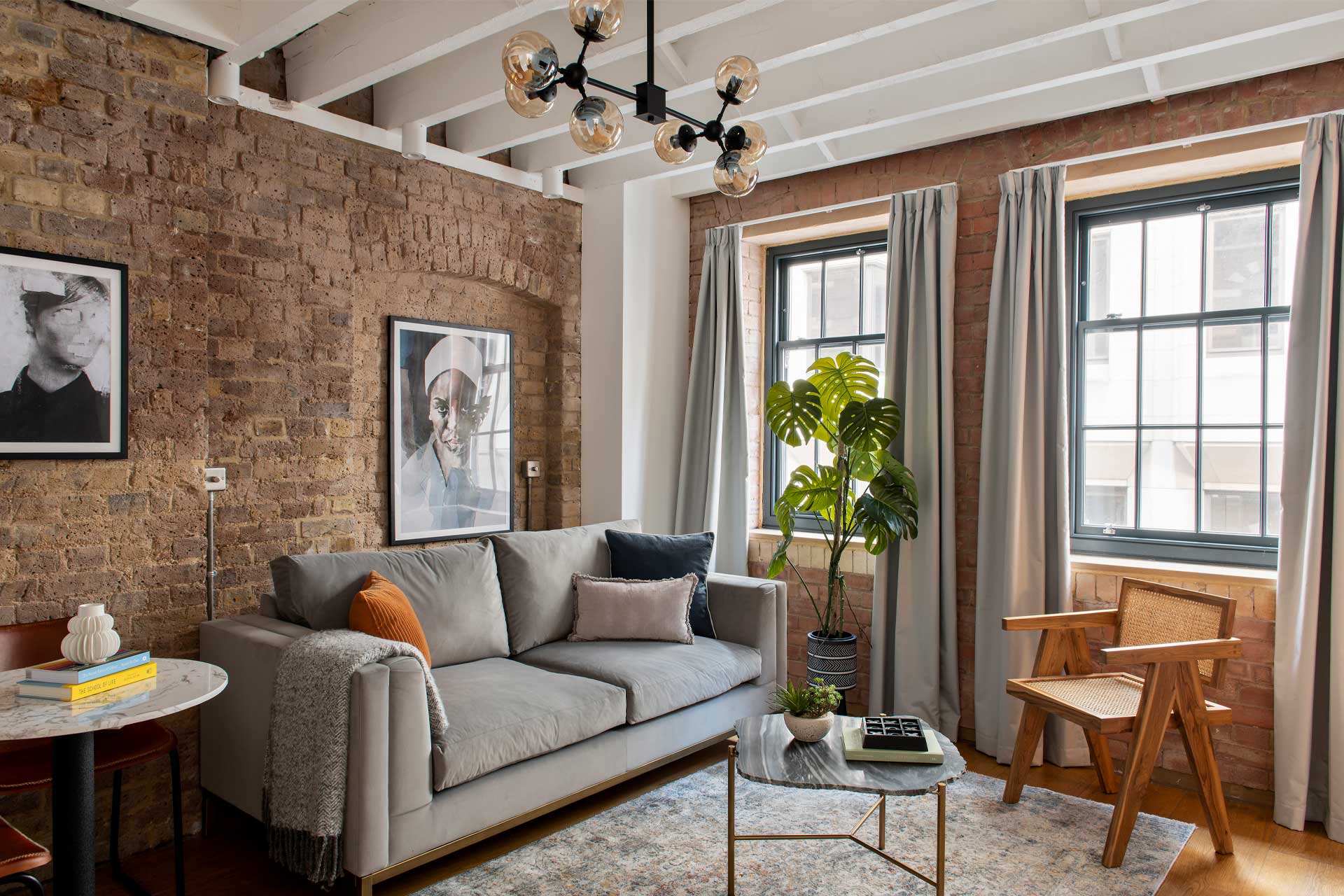
HOTEL MEETS CO-LIVING
As the city’s housing market reaches unattainable heights for many – the median price for a home in London was a staggering £495,000 in Q4 of 2020 according to the Office for National Statistics – co-living has emerged as a solution to the crisis, bridging the gap between short- and long-term rentals while creating more convenience and community for upwardly mobile professionals.
For hospitality brands trading in the short-term rental market, the arrival of apartment operators like The Collective, which manages two locations in the capital and has a third on the way, has only reinforced the need to build a cult following of like-minded people.
Sensing an opportunity to capture this burgeoning demand, global co-living group Vonder recently evolved its concept with the opening of a community-driven hotel in Earls Court and will soon unveil another in Paddington.
Joining existing sites in Berlin, Dublin and Dubai, the two properties will comprise a total of 95 rooms, providing an alternative, affordable option to those looking to reside in the capital for one to three months, whether that be for business, studying or leisure.
Alongside its 73 rooms, spread across three townhouses within walking distance of each other in the west of the city, Vonder Hotel Kensington features a communal café and garden – the latter hosts wellness sessions such as yoga, fitness classes and meditation, together with music concerts, open-air parties and cinema nights to create a sense of community amongst its residents.
Likewise, Latin American hospitality group Selina – which planted its first flag in the capital this May – has launched CoLive, a long-term accommodation and co-working package geared towards the influx of remote workers. The month-by-month rental programme allows modern nomads to reside in up to three different destinations per 30 nights, charging them the same fixed rate every month while providing access to furnished suites and community rooms, daily wellness classes, a free hot desk and on-site facilities from swimming pools and libraries to bars and movie rooms.
HOTEL MEETS RESIDENTIAL
As a consequence of this blurring, residential styles have filtered through to hospitality, with a rising number of interior designers from the private sector bringing their expertise to new hotel developments in London.
Operators and developers are seeing the benefits of adding a residential component to their projects too – Marriott and Accor have both launched new websites dedicated to homes, villas and apartments – while luxury brands are increasingly offering private residences within their portfolios. The forthcoming Raffles, Mandarin Oriental Mayfair and Admiralty Arch Waldorf Astoria all have apartments available for purchase, meaning that owners can combine the exclusivity of their own home with the facilities of a hotel.
The shift towards selective seclusion has also played into the hands of serviced apartments, with self-contained units performing far better than hotels throughout the pandemic. As such, fast-growing group Edyn has launched a new serviced apartment brand named Cove, while Dorsett Hospitality International is set to debut its own aparthotel concept, Dao by Dorsett, in London later this year.
As hospitality continues to evolve, its innovators and game changers are tapping into this convergence of sectors with conviction, so much so that IHIF – generally regarded as the leading hotel investment conference – has added a new pop-up event to its main Berlin conference in September that will focus on adjacent concepts such as hostels, co-working, student accommodation, serviced apartments and co-living. Exploring investment beyond the hotel room, Adjacent Spaces is inviting owners, operators, architects and designers to share knowledge, exchange ideas and look to shape the future of the industry – how that will look remains to be seen.
CREDITS
Words: Ben Thomas
Headline Image: 180 House
Related Posts
30 November 2015
European Hotel Design Awards 2015
21 January 2015
European Hotel Design Awards 2014
19 May 2009

